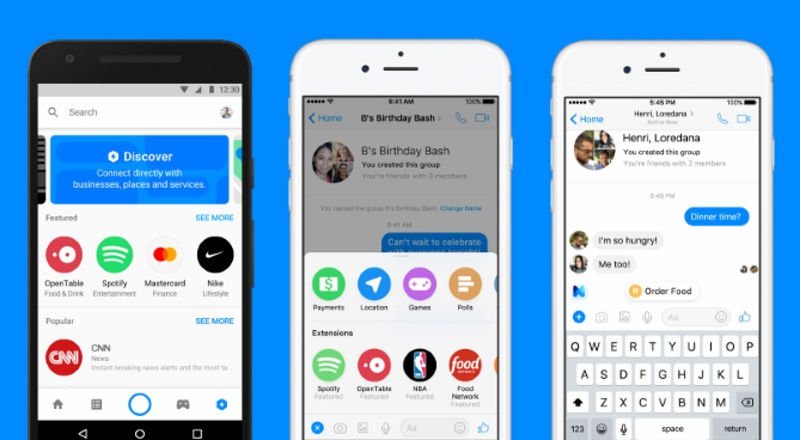
Last year, when Facebook said its chat application, Messenger, would get users to talk to businesses through automated bots, it sparked a wave of hype – and then skepticism, because the tools were so rarely used.
Part of that was on purpose, says David Marcus, head of Facebook Messenger. He wanted to give businesses a year to build good bots first. Now he wants to make them easy to find. “While the first couple of months had experiences that weren’t that great, frankly, now we’re in a place where we have experiences that are good,” Marcus said ahead of Facebook’s F8 developer conference, Tuesday in San Jose, California.
Messenger will now have a tab highlighting businesses that people can connect with – real estate where advertisers will eventually be able to pay to reach Messengers 1.2 billion users.
A separate tab will tout turn-by-turn games, like poker and chess, that people can play while chatting with friends. Messenger will also let businesses use its artificial intelligence software to give automated answers to basic questions, like hours of operation.
All this will help Marcus demonstrate a business model for Messenger, which has more users than Facebook’s Instagram but a much more nascent plan. While Instagram’s feed-based photo app could easily take on a version of Facebook’s news feed advertising model, the chat application needed something built from scratch.
Facebook Chief Executive Officer Mark Zuckerberg has told investors he’s not in any rush to make money from Messenger. But it couldn’t hurt: Facebook’s expenses are rising, and the company has decided to stop increasing the amount of advertising in its news feed, which could slow revenue growth.
For the last year, Facebook has been selling ads that direct people from the news feed into a chat with a business’s Messenger bot. Messenger has started to display more basic ads too, on the main page with users’ chat histories.
There are more inventive ideas in the queue. Marcus mentioned a test program with the Golden State Warriors, where people visiting the NBA team’s stadium could use their phones to order food or merchandise to their seats, by taking a picture of a code to prompt a chat about it.
Marcus says the business will start to get more interesting, in part, because people are using Messenger more frequently. The tool used to be part of the main Facebook product, where people associated it with contacting Facebook friends, instead of with texting.
“People are using messenger as their primary communications platform, more and more,” Marcus said, “as opposed to this thing that you use for the friend you don’t have a phone number for.”
[“source-ndtv”]






